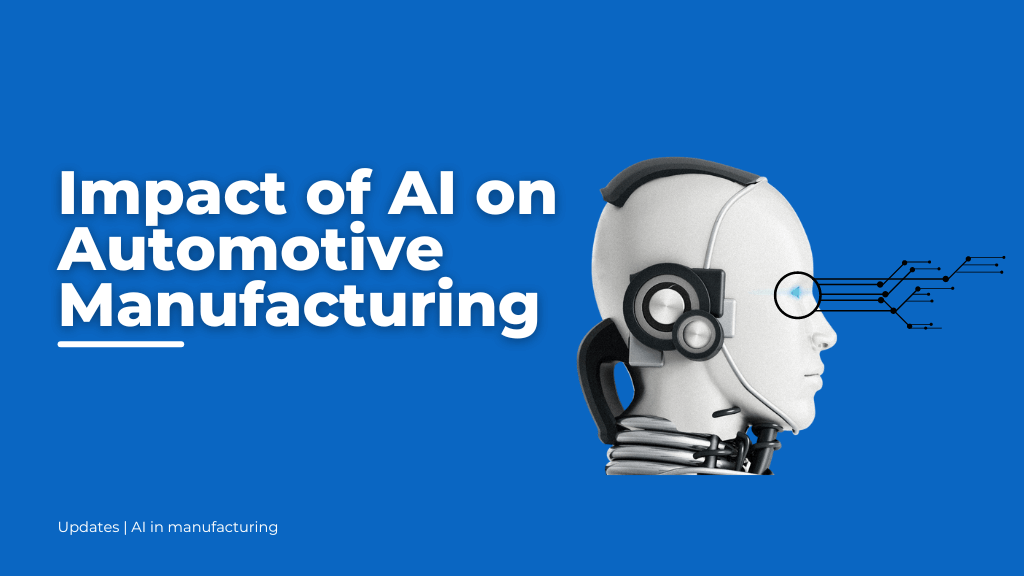Summary: The automotive industry has seen a lot of ups and downs due to being heavily reliant on the human workforce. But with AI in manufacturing becoming all-prevailing, this industry too has witnessed some drastic changes. Starting from rethinking the driving experience to designing for safety, many use cases of AI have been derived and adopted. Through interesting facts to know, in this article, we will look at the impact that this technology has had on the automotive sector.

Introduction
The emerging futuristic technologies have gripped the automotive industry hard. It has influenced people’s interaction with their cars, simplified a driver’s life, and transformed vehicle manufacturing.
For example, the car manufacturer Volvo has launched an AI-powered automated car inspection. That takes seconds to inspect the entire car, like tyres, underbody components, car exteriors, defects, safety, and missing spare parts.
This is just one of the many innovations that are driving this industry currently. In this article, we delve into how AI technology has catapulted automotive manufacturing and streamlined the overall process.
So, let’s begin the journey.
Impact of AI on the Automotive Manufacturing Process

1. Personalization
Gone are the days when people relied on the ready-made model of a car before buying it.
Nowadays, people look for distinctive features that add comfort to their driving experience. This way, a car has become a form of self-expression.
Hence, to personalize the driving experience, ensure safety, and curb inefficiencies, many machine learning algorithms and data analysis tools with AI capabilities have been developed. It allows the customization of features, designs, systems, and advancements as per the user’s preferences and choices. Based on that, the manufacturer manufactures the automobile.
2. Quality
Maintaining the car’s quality consistently is always a concern for manufacturers. Hence, AI algorithms have been introduced to improve the customer count, revenue, and AI based visual inspection. These algorithms help with faster defect detection and issue resolution within a short turnaround time. They also alert the manufacturers and the drivers about the smallest errors or defects at an early stage that can become critical.
3. Streamlining the supply chain process
Using AI and data, the makers can now generate predictive demand forecasting for the high-in-demand models, which also helps them maintain their inventory. Moreover, due to ongoing supply chain issues and delays, the customer experience is being compromised. To ensure a smooth supply and first-rated experience, the automotive manufacturer uses AI algorithms that understand the process and make it smooth.
4. Safety
One of the significant benefits of AI is that it has pushed the threshold of safety through machine learning and predicting user behavior to enable safety measures.
Additionally, the manufacturing of autonomous vehicles with Automotive Advanced Driver Assistance Systems (ADAS) has been a game-changer in the automotive industry. It is expected to hit a market growth of US$ 202.7 billion by 2033. The self-driving cars have integrated AI technology that understands the surroundings without human intervention, which further helps in organized traffic flow, fewer fatalities on the road, and accessibility of the car to people who cannot drive.
Some examples of self-driving cars are Tesla, Volvo, BMW, and Lexus.
5. Manufacturing has become less time-intensive.
Before the launch of AI, the automobile manufacturing process was time-intensive. The cost of production was high due to significant human interventions. However, with the advent of AI and ML, the manufacturing of automobiles has become faster, more accurate, and more precise, with room for detailed customization.
For instance, there was a time when the automotive parts were shifted manually from the conveyor belt. Which was time-consuming, laborious, and an inefficient way to complete the process. Now, the same process is conducted by robots and specially designed machines powered by AI.
It has thus reduced human fallacies, sped up the manufacturing process, and reduced the chance of defects or mishaps.
6. Car Designing
An automotive manufacturer has various tasks, from crafting the vehicle to designing internal processes, which can be a time-consuming affair. But with AI’s intervention, manufacturers can do real-time tracking, programmable shading, instant modifications, 3D-effective views, and even driving experiences through augmented and virtual reality, among other chores, to simplify the design process. The faster design minimizes the time required for sanctioning and approval.
7. Predictive maintenance
When combined, IoT and AI technology help car manufacturers find defects without the help of experts. The built-in IoT predictive maintenance assists in tracking a trove of data, thus enabling the manufacturers to determine the issue, reduce emissions, optimize fuel, and inspect overall quality.
8. Other benefits of AI-enabled manufacturing
- Enhanced customer experience: Many automotive manufacturing companies have integrated AI technology to enhance a person’s experience while driving or sitting in the car. For example, a time monitoring system helps to track and collect real-time data on the car, like mileage, distance covered, fuel used, and damage to the car. It also enables drivers to drive automatically or navigate the road correctly.
- Improved car safety: They have integrated highly efficient road safety features like lane departure, departure warning, and autonomous emergency brakes that alert the drivers and prevent fatal accidents.
- Virtual car inspection: The time has gone when buyers used to visit the dealerships for an overall physical inspection of the car. Now, manufacturers have installed AI technology that lets you virtually view cars from the comfort of your home. The integrated AI model zooms in on each part to ensure that your car is free from defects and has all the required features.
- Expedite car insurance claims: Car insurance is not an automated process; it takes time to disburse the claims after a proper on-ground audit of manufacturing quality. To expedite the whole process, the manufacturers have integrated AI algorithms that collect the driver’s data, store the incident report, process images, and analyze the discrepancies to process the claims quickly.
The Future of AI in Automotive Manufacturing
Leveraging this next-gen technology, the car manufacturing process has become seamless, effective, and defect-free, reducing overall costs. It is predicted that manufacturing will become more modular and human intervention in car design will be reduced.
There will be a tectonic shift in the supply chain, cars will become cheaper, and the overall process will become optimized. AI-empowered autonomous vehicles and advanced driver assistance have already entered the market. It is predicted that these tech-driven features will enhance efficiency, boost car safety, and reduce car mishaps by keeping a check on drivers’ drowsiness and distractions and alarming them about threats.
The automotive segment is identified as the most lucrative industry for generative AI, with the largest market share of 33.5% and an approximate worth of $2105 million by 2032.
Conclusion
The AI revolution in automotive manufacturing has brought many benefits to the table. It has replaced the standard manufacturing process with a precise, safe method. With further advancements in technology, AI is believed to become the forerunner of the automotive industry. Also will leave a footprint that can’t be erased.

